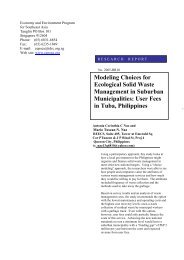systems research - the IDRC Digital Library - International ...
systems research - the IDRC Digital Library - International ...
systems research - the IDRC Digital Library - International ...
You also want an ePaper? Increase the reach of your titles
YUMPU automatically turns print PDFs into web optimized ePapers that Google loves.
The types of <strong>the</strong> training provided to <strong>the</strong> farmers and <strong>the</strong>ir reactions to <strong>the</strong><br />
training are shown in Table 15. The intervened group of farmers attended more<br />
training programs conducted by <strong>the</strong> FSP than <strong>the</strong> control farmers.<br />
Effectiveness of o<strong>the</strong>r FSR activities<br />
Most farmers in both groups said that <strong>the</strong>y had replaced <strong>the</strong> traditional technology<br />
with <strong>the</strong> improved technology introduced by <strong>the</strong> FSP. According to <strong>the</strong> farmers,<br />
knowledge about <strong>the</strong> adoption of chemical fertilizers, improved seeds, im roved<br />
fodder trees, and forage grasses took place only after <strong>the</strong> establishment o F <strong>the</strong> FSR<br />
in <strong>the</strong>ir site. Participation of both groups in various FSR activities (e.g., pro ram<br />
planning and decision making, selection of participant farmers, and training ", were<br />
reported to be highly satisfactory. Farmers In both groups felt that <strong>the</strong>ir suggestions<br />
and opinions in'solving <strong>the</strong> problems encountered during implementation of work<br />
plans and selection of <strong>the</strong> recommended technologies were well considered by <strong>the</strong><br />
FSP.<br />
However, both groups of farmers were not satisfied with <strong>the</strong> supply of inputs.<br />
Three of <strong>the</strong> six intervened farmers and two of <strong>the</strong> six control farmers reported that<br />
supplies of inputs by <strong>the</strong> concerned agency were insufficient and untimely.<br />
ROLE OF OTHER SUPPORT-SERVICE INSTITUTIONS IN THE TRANSFER<br />
OF FSR-IDENTIFIED TECHNOLOGY<br />
Extension service in <strong>the</strong> area<br />
The FSR and <strong>the</strong> Agriculture Development Office (ADO) have separate mandates<br />
and targets. From 1985 to 1990 <strong>the</strong>re was no extension agent assigned by <strong>the</strong> ADO<br />
in <strong>the</strong> Pumdi Bhumdi area. The linkage between <strong>research</strong> and extension was good<br />
but limited to training programs, participation in Samuhik Bhramnn<br />
(multidisciplinary team visits), and working group meetings.<br />
Credit supply<br />
Cash was a limiting factor for inputs (e.g., seed, fertilizers, and pesticides) required<br />
to adopt improved technology. However, credit to farmers was limited, and <strong>the</strong><br />
process was so complicated that farmers could not take advantage of this facility.<br />
The Agriculture Development Bank (ADB) at Pokhara provided loans for<br />
agricultural activities according to recommendations made by <strong>the</strong> ADO, Pokhara.
















